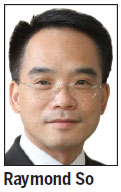Importing electricity does not mean lower reliability
Updated: 2014-06-05 06:31
By Raymond So(HK Edition)
|
|||||||||
The government is now undertaking a public consultation on the future fuel mix for electricity generation, which will end on June 18. It is a tough issue and has recently sparked considerable debate. Sadly, the current debate does not target the real issues and has left a lot of problems unresolved.
The background to the fuel mix debate dates back to the previous government. We all know Hong Kong has a problem with air pollution. Obviously, one of the major causes of this is power generation. A few years ago, the two power companies in Hong Kong used coal as the main source of fuel when producing electricity. Burning coal generates a lot of greenhouse gases, and the environment suffers. The government then introduced legislation to reduce air pollution by the year 2020. The emission of greenhouse gases will also be greatly reduced.
To meet these rigorous standards, the power companies began to switch to a heavier use of natural gas when producing electricity. According to industry statistics, emissions by power companies have been reduced substantially in recent years. But there is a price to pay for better air quality. The two power companies need to invest more in new generators which use natural gas. Also, the price of natural gas is higher than the price of coal. So society has to pay higher electricity prices. Annual tariff reviews have partly reflected increases in the costs of production.

The government was aware of this. On one hand, there was a strong need for better air quality. On the other, there was a need for lower tariffs. The dilemma is that these two requirements cannot be achieved together. The government suggested that Hong Kong could have 50 percent of its electricity supply coming from nuclear power, 40 percent from natural gas, and 10 percent from coal and other sources. The objective is to have cheap nuclear power to offset expensive natural gas. In this way, emission standards can be met and the price of electricity is still affordable. The fuel mix is called "541" - a term which reflects the percentages of the different energy sources.
The "541" scheme could have succeeded in achieving these policy goals. However, the Fukushima incident in Japan in March 2011 caused a great deal of concern about the use of nuclear energy. It is now highly unlikely that the original "541" scheme will be passed in the Legislative Council. The government has modified its plans and introduced two options for the fuel mix. One is to import electricity from the mainland, and the other is to increase the use of natural gas during power generation.
To many Hong Kong people, importing electricity from the mainland is an unpopular option. It is well-known that electricity shortages are common on the mainland. The reliability of power supply there is lower than that in Hong Kong. It is unsurprising that many critics of importing electricity from the mainland cite concerns about power reliability.

However, this belief is not based on scientific evidence. While it is true that power supply reliability on the mainland is lower than in Hong Kong, measuring this reliability is greatly affected by the environment. The China Southern Power Grid (CSPG) has operations in many provinces. Network coverage is much larger than in Hong Kong. By definition, the length of power shortages will be longer than for Hong Kong. The reason for this is simple. With a larger client base to serve, the CSPG cannot be risk-free. When network coverage is large, it is inevitable there will be accidents. These in turn lead to a higher rate of power shortages. Hence, it is unfair to compare power shortage figures between the mainland and Hong Kong. It is like comparing apples and oranges.
The current debate on fuel mix focuses greatly upon reliability. It is true that natural gas is a reliable source of energy. There is considerable public concern about lower power supply reliability. But it must be stressed that importing electricity from the mainland will not necessarily mean lower reliability. There is simply no correlation between power reliability for a particular user and that of the CSPG. Hence, importing electricity from the mainland does not inevitably mean lower reliability.
This discussion aims to explain why importing electricity from the mainland does not necessarily mean lower reliability. But I am not saying we should import electricity from the mainland. The real issue is not about the lengths of power shortages. It is about examining things from a wider perspective. How will the two options affect overall development of the electricity market? Will there be an opening up of the market if a particular option is chosen? What will have a significant impact on power tariffs? There are many questions yet to be answered.
The author is dean of the School of Business at Hang Seng Management College.
(HK Edition 06/05/2014 page9)